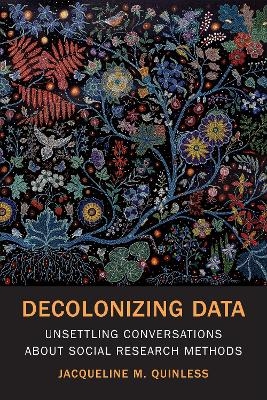
Decolonizing Data
University of Toronto Press (Verlag)
978-1-4875-0440-3 (ISBN)
- Titel ist leider vergriffen;
keine Neuauflage - Artikel merken
Decolonizing Data explores how ongoing structures of colonialization negatively impact the well-being of Indigenous peoples and communities across Canada, resulting in persistent health inequalities. In addressing the social dimensions of health, particularly as they affect Indigenous peoples and BIPOC communities, Decolonizing Data asks, Should these groups be given priority for future health policy considerations?
Decolonizing Data provides a deeper understanding of the social dimensions of health as applied to Indigenous peoples, who have been historically underfunded in and excluded from health services, programs, and quality of care; this inequality has most recently been seen during the COVID-19 pandemic.
Drawing on both western and Indigenous methodologies, this unique scholarly contribution takes both a sociological perspective and the "two-eyed seeing" approach to research methods. By looking at the ways that everyday research practices contribute to the colonization of health outcomes for Indigenous peoples, Decolonizing Data exposes the social dimensions of healthcare and offers a careful and respectful reflection on how to "unsettle conversations" about applied social research initiatives for our most vulnerable groups.
Jacqueline M. Quinless is an adjunct professor in the Department of Sociology at the University of Victoria.
Contents
List of Tables
List of Figures
Acknowledgments
Dedication
Preface
Relational Accountability
About this Book
How the Book is Organized
1.Introduction
The Importance of Power and Place: Place-Based Consciousness
Who is Indigenous?
Indigenous Peoples and the Urban Landscape in Canada
Indigenous Perspectives on the Good Life
The Link Between Social Capital and Indigenous Well-Being
2. The Impacts of Colonization on Indigenous Health and Well-being
Setter State Policy and Indigenous Peoples
Assimilation Policy and Poor Health Outcomes
The Indian Reserve System
The Residential School System
Historical Trauma for Generations to Come
Acts of Reconciliation
The 1996 Royal Commission on Aboriginal Peoples (RCAP)
The 2015 Truth and Reconciliation Commission (TRC)
3. Decolonizing Bodies and a Self-Governing Health System
Indigenous Well-being and Urban Life
Beyond the Western Medical Model and Decolonizing Bodies
Health Transformation and Self-Determination
Health Governance and the First Nations Health Authority
4. Social Capital Theory, Health Indicators and Indigenous Communities
Historical Overview: Bourdieusian Social Capital and Health Status
Social Capital Analysis and Applied Social Research
Social Capital Theory and Colonization
Moving Beyond the GDP: Social and Economic Indicators of Well-being
How is Well-Being Measured in Canada?
How is Indigenous Well-Being Measured in Canada?
Indigenous Health Indictors Frameworks
5. Decolonizing Data and Critical Research Methods
Decolonizing Methodologies
Ethics: Honoring Indigenous Protocols and Relational Accountability
Participation Action Research and Indigenous Communities
Two-Eyed Seeing and Indigenous Health Outcomes
Qualitative Findings
The Origin Story of the First Nations Perspective on Health and Wellness
Traditional Knowledge
Data Governance and Ownership
From Illness Models to Wellness Perspectives
A Critical Data Approach
Decolonizing Data and Indigenous Health Outcomes
The 2012 Aboriginal People’s Survey and Measuring Historical Trauma
Individual and Community Level Factors Affecting Indigenous Health Outcomes
Quantitative Findings
Transgenerational Trauma and Health Outcomes
Indigenous Culture as Resistance to Trauma
6. Conclusion
Indigenous-Based Determinants of Health and Wellness
Social Capital and Indigenous Health and Wellness
Critical Reflections
Allyship and Solidarity
Relational Allyship and Responsive Research
Responsive Research, the TRAC Method and Indigenous Data Sovereignty
The Limitations of Two-Eyed Seeing
Indigenous Data Sovereignty
References
| Erscheinungsdatum | 06.09.2021 |
|---|---|
| Zusatzinfo | 1 b&w map, 5 b&w figures, 5 b&w tables |
| Verlagsort | Toronto |
| Sprache | englisch |
| Maße | 158 x 235 mm |
| Gewicht | 350 g |
| Themenwelt | Sachbuch/Ratgeber ► Gesundheit / Leben / Psychologie |
| Sozialwissenschaften ► Ethnologie | |
| Sozialwissenschaften ► Soziologie | |
| ISBN-10 | 1-4875-0440-3 / 1487504403 |
| ISBN-13 | 978-1-4875-0440-3 / 9781487504403 |
| Zustand | Neuware |
| Haben Sie eine Frage zum Produkt? |
aus dem Bereich


